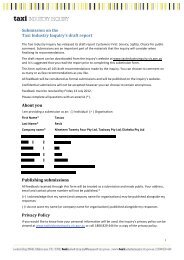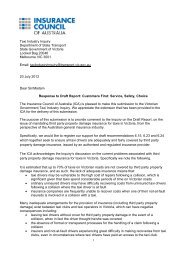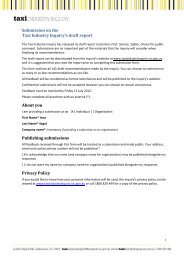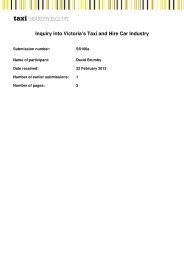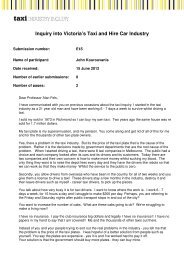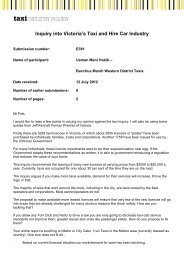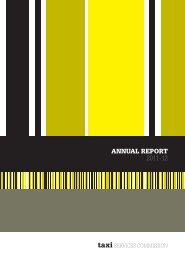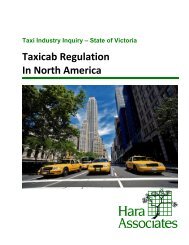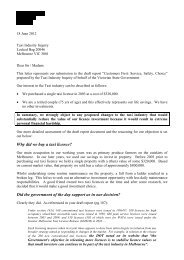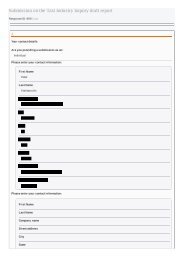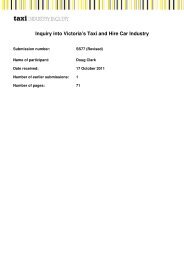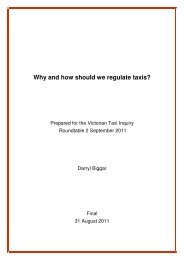Part D â Understanding and improving industry performance (PDF ...
Part D â Understanding and improving industry performance (PDF ...
Part D â Understanding and improving industry performance (PDF ...
You also want an ePaper? Increase the reach of your titles
YUMPU automatically turns print PDFs into web optimized ePapers that Google loves.
2. Supplying uneconomic services<br />
The second argument in favour of entry restrictions<br />
is that taxis are ‘common carriers’ forced to provide<br />
uneconomic services alongside more profitable services<br />
<strong>and</strong> that it is necessary to restrict competition <strong>and</strong> keep<br />
order in the market for these services to continue. For<br />
example, there are rules that unprofitable short fares<br />
cannot generally be refused <strong>and</strong> that taxis should provide<br />
services continuously across the week. This issue is<br />
raised most often in relation to country areas, where taxis<br />
are seen as having more of a ‘public transport’ role.<br />
There are two problems with using entry regulation<br />
to compensate taxi operators for providing<br />
uneconomic services:<br />
• First, commercial firms operating in such a market<br />
will always face strong incentives to only do things<br />
that are commercial, as this will maximise their profits.<br />
Therefore, a high degree of monitoring by the regulator<br />
will be required to enforce the regulations. This is<br />
apparent in the Melbourne metropolitan zone in the<br />
significant reported issues around short fare refusals.<br />
• Secondly, it is very difficult to determine by ‘how<br />
much’ competition should be restricted to achieve the<br />
objective. The <strong>industry</strong> will face strong incentives to<br />
overstate the costs of providing uneconomic services,<br />
as this will achieve a greater degree of restriction <strong>and</strong><br />
a higher level of profitability.<br />
A final point is that it would be more transparent <strong>and</strong><br />
efficient for government to fund any uneconomic<br />
services directly.<br />
It is not obvious to the inquiry that the benefits of<br />
requiring operators to provide uneconomic services could<br />
exceed the costs of restriction identified earlier.<br />
3. Improving <strong>industry</strong> viability<br />
The third argument supporting restrictions on licences<br />
is that they improve the viability of the taxi <strong>industry</strong> by<br />
minimising ‘dead running’ (the costs of running the taxi<br />
unoccupied) because occupancy is kept higher than it<br />
might otherwise be. Undoubtedly, entry restrictions do<br />
keep occupancy rates higher. This provides an efficiency<br />
benefit in that fewer vehicles are required to produce a<br />
given quantity of taxi trips. However, the inquiry notes<br />
two problems with using licence restrictions to keep<br />
occupancy high:<br />
• The value to taxi operators of generally higher<br />
occupancy rates becomes factored into the rental<br />
price of the licence 45 – This effect may be understood<br />
by considering what would happen if the number<br />
of taxis was reduced: occupancy rates are likely to<br />
rise 46 <strong>and</strong> so will the profitability of all taxi operators.<br />
However, this effect will be temporary. Operators<br />
will compete for new assignments by bidding<br />
away the new profits that are created. The value of<br />
the ‘occupancy benefit’ is therefore appropriated<br />
by licence holders. The implication of this is very<br />
important: the financial pressures faced by operators<br />
<strong>and</strong> taxi drivers, <strong>and</strong> the incentive to cut costs <strong>and</strong><br />
overcharge passengers, will be the same as when<br />
there are no licensing restrictions. If the operator has<br />
to lease a licence, the required occupancy rates for a<br />
taxi operator to break even are much higher than they<br />
would be if licences were not restricted (<strong>and</strong> had no<br />
value). In other words, there is no sustainable benefit<br />
that can accrue to either taxi operators (or indeed<br />
to taxi drivers) from licensing restrictions unless<br />
further restrictions are imposed. Service delivery<br />
can therefore be expected to be no better under a<br />
restricted entry regime than an unrestricted regime.<br />
• Restricting the number of vehicles makes waiting<br />
times longer for consumers than they would<br />
otherwise be at certain times or locations – This<br />
has the effect of reducing consumer dem<strong>and</strong> for<br />
taxi services <strong>and</strong> reducing the number of trips<br />
undertaken. As identified earlier in this chapter, using<br />
entry controls to increase efficiency can only be<br />
justified if the introduction of new vehicles will have<br />
no effect on waiting times (<strong>and</strong> therefore on dem<strong>and</strong>)<br />
or that lower waiting times do not affect dem<strong>and</strong>.<br />
If not, there is a risk that the licensing authority will<br />
set supply at a level that does not deliver the kind<br />
of service that consumers prefer. Consumers may<br />
prefer a service with lower waiting times, even if<br />
higher prices result from lower occupancy rates.<br />
Many submissions to the inquiry suggest that<br />
service availability is lacking at certain times, not<br />
just in Melbourne but across Victoria. Without entry<br />
restrictions, waiting times would almost assuredly be<br />
lower <strong>and</strong> dem<strong>and</strong> higher at peak times.<br />
45 Only better-than-average occupancy <strong>performance</strong> cannot be captured<br />
by licence holders<br />
46 So long as the increase in waiting time does not decrease dem<strong>and</strong> so<br />
much that trips per vehicle falls<br />
194



